Diplomatic Bluebook 2019
Chapter 2
Japan's Foreign Policy that Takes a Panoramic Perspective of the World Map
2 East Africa
(1) Uganda
Under President Museveni's long-serving administration since 1986, Uganda has enjoyed sustained economic growth thanks to stable domestic politics and it has contributed to regional stability as one of the important and influential countries in East Africa. Uganda also actively accepts refugees, including South Sudan refugees staying in the northern part of the country.
During the TICAD Ministerial Meeting in October, Parliamentary Vice-Minister for Foreign Affairs Tsuji met with Minister of State for Foreign Affairs Okello. State Minister for Foreign Affairs Sato also visited Uganda in November to meet with President Museveni and to attend a ceremony to commission the Nile Bridge built with the support of Japan.
(2) Ethiopia
With more than 100 million citizens, Ethiopia has the largest population in the East Africa region. Ethiopia plays an important political role in the region and is home to the headquarters of the AU. It is also the Chair of the Intergovernmental Authority on Development (IGAD). On the economic front, Ethiopia has been enjoying continuously robust economic growth, and is aiming to become a middle-income country.
Political and economic reforms have advanced in the country since the inauguration of the new Prime Minister, Abiy, in April. Also, in July, Ethiopia announced the re-establishment of the diplomatic relations with Eritrea for the first time in 20 years following a prolonged border conflict and signed the “Joint Declaration of Peace and Friendship.”3
Special Adviser to the Prime Minister Sonoura visited Ethiopia in August. State Minister of Foreign Affairs Aklilu visited Japan in February and Special Envoy to the Prime Minister of Ethiopia Seyoum later visited Japan in August. State Minister of Foreign Affairs Afework attended the TICAD Ministerial Meeting in Japan in October and held talks with Parliamentary Vice-Minister for Foreign Affairs Tsuji. In November, Arkebe, Head of Economic Planning, Monitoring and Supporting Sector, Office of the Prime Minister, visited Japan to receive the Order of the Rising Sun, Gold and Silver Star.
- 3 Japan welcomed this and issued a statement by the foreign minister that hoped for the development of relations between the two countries and their contribution to the further stability and prosperity of the Horn of Africa.
(3) Eritrea
Eritrea gained its independence from Ethiopia in 1993, but a border dispute that broke out from 1998 to 2000 left the two countries in a state of conflict. Then, their relationship improved, and the two countries re-established diplomatic relations for the first time in 20 years in July 2018. The relationship with neighboring countries have also improved, such as the establishment of diplomatic relations with Somalia in that same month, and in November, the resolution to lift sanctions imposed by the UN Security Council since 2009 was unanimously adopted.
Also, State Minister for Foreign Affairs Sato and State Minister for Internal Affairs and Communications Okuno visited Eritrea in August.
(4) Kenya
Kenya plays a central role in the regional economy with its port in Mombasa, the largest in East Africa, serving as a gateway to East and Central Africa. Kenya also contributes to the peace and stability of the region as a stabilizing force in East Africa by engaging in efforts to build peace in Somalia, South Sudan, and elsewhere. On the domestic affairs front, President Kenyatta launched the BIG4 five-year economic development plan consisting of the pillars of (1) manufacturing, (2) food security, (3) universal health coverage, and (4) affordable housing, and is engaged in a new nation building effort.
Minister for Economic Revitalization Motegi visited Kenya in August. Cabinet Secretary for Foreign Affairs Juma attended a foreign ministers' meeting during her visit to Japan for the TICAD Ministerial Meeting in October. In November, State Minister for Foreign Affairs Sato visited Kenya to attend the Sustainable Blue Economy Conference, which was hosted by the Government of Kenya and co-sponsored by Japan.
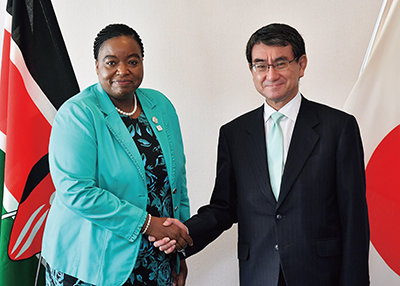 Japan-Kenya Foreign Ministers' Meeting (October 7, Tokyo)
Japan-Kenya Foreign Ministers' Meeting (October 7, Tokyo)(5) Union of Comoros
The Union of Comoros is an island country located in the Indian Ocean. Long-standing political unrest and an agricultural-based economy that is susceptible to climate conditions are obstacles to its economic growth and social development. In July, a constitutional amendment was made by a referendum which allowed for the re-election from Grande Comore, the home of incumbent President Azali, while maintaining the rotating system of presidential elections.
With respect to Japan-Comoros relations, at the foreign ministers' meeting held during Foreign Minister Souef's visit to Japan in February, a Japan-Comoros foreign ministers' joint press statement was issued. Japan also gained support for a “Free and Open Indo-Pacific” which Japan is promoting. State Minister for Foreign Affairs Sato visited the Union of Comoros in August and made a courtesy call to President Azali. It was a year in which a number of high-level bilateral visits were organized. During his visit to Japan to attend the TICAD Ministerial Meeting in October, Secretary of State in charge of Cooperation at the Ministry of Foreign Affairs and International Cooperation Djoumoi held talks with State Minister for Foreign Affairs Sato.
(6) Djibouti
Djibouti, situated at one of the great trade arteries that passes through the Indian Ocean and connects Europe and Asia, is aiming to be a distribution hub of East Africa. It is a base for international security and is a key country in achieving a “Free and Open Indo-Pacific.”
Since 2011, Djibouti has been hosting the installations of the Japan Self-Defense Forces to carry out antipiracy activities, and the two countries have been developing excellent relationship. In August 2018, Minister of Foreign Affairs and International Cooperation Youssouf visited Japan to hold a foreign ministers' meeting and issued a Foreign Ministers' Joint Press Statement affirming to further strengthen the two countries' bilateral ties and cooperate in the international arena. During his visit to Japan in October to attend the TICAD Ministerial Meeting, Secretary General of the Ministry of Foreign Affairs and International Cooperation Ali Hassan held talks with Parliamentary Vice-Minister for Foreign Affairs Yamada.
(7) Seychelles
Although Seychelles has the highest gross national income per capita (GNI) of 14,180 US dollars in Sub-Saharan Africa, it is a small island country with vulnerabilities in fields such as climate change and disaster prevention.
There were a number of high-level visits in 2018. In August, State Minister for Foreign Affairs Sato visited Seychelles. During his trip to Japan in October to attend the TICAD Ministerial Meeting, Executive Head of the Department of Foreign Affairs Faure held talks with State Minister for Foreign Affairs Sato. In December, Vice President and Minister of Foreign Affairs Meriton visited Japan and held a foreign ministers' meeting in which a Japan-Seychelles Foreign Ministers' Joint Press Statement was issued. The Embassy of Japan in the Republic of Seychelles was established in January 2019, and bilateral relations are expected to further develop.
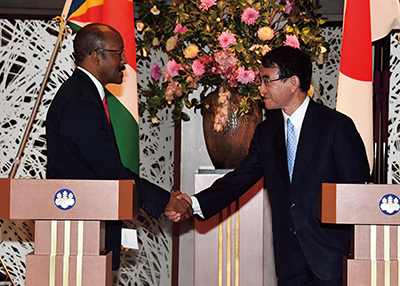 Japan-Seychelles Foreign Ministers' Meeting (December 5, Tokyo)
Japan-Seychelles Foreign Ministers' Meeting (December 5, Tokyo)(8) Somalia
The peace and stability of Somalia is important for regional and global peace and stability, and the international community including Japan supports Somalia's nation building. Although Al Shahab (AS), an extremist faction of the international terror organization Al-Qaeda, remains active and humanitarian crises resulting from the impact of droughts and other causes still remain to be solved, efforts are being made to stabilize the public safety and to achieve economic growth.
During his visit to Japan to attend the TICAD Ministerial Meeting in October, Secretary of State for International Cooperation Abdulkadir held talks with State Minister for Foreign Affairs Sato. Also, in December, Foreign Minister Kono made a courtesy call to Prime Minister Khaire during his visit to Qatar.
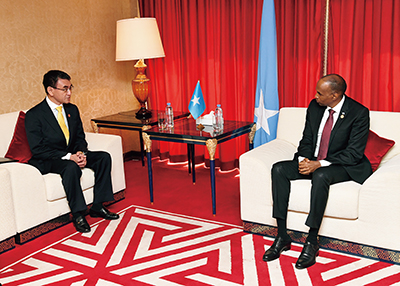 Foreign Minister Kono's courtesy call on Somalia's Prime Minister Khaire (December 15, Qatar)
Foreign Minister Kono's courtesy call on Somalia's Prime Minister Khaire (December 15, Qatar)(9) Sudan
Sudan is the second largest country by area in Sub-Saharan Africa, and is blessed with crude oil, minerals, as well as water resources and fertile arable land from the Nile River. In recent years, the domestic security situation has been improving, with the situations in South Sudan and Darfur improving. Also, since the U.S. lifted economic sanctions on South Sudan in October 2017, it is expected to have a positive impact on the economy. With regards to the domestic affairs, the Government of Sudan is currently initiating a national dialogue process toward a comprehensive national reconciliation, and aims to hold a presidential election in 2020 with all parties participating.
In October, Foreign Affairs State Minister Osama Faisal attended the TICAD Ministerial Meeting, and held talks with State Minister for Foreign Affairs Sato.
(10) Tanzania
Tanzania, which supports the peace and stability in East-South Africa, has sustained high economic growth for many years. In recent years, the private sector's willingness to conduct business in Tanzania is high, and the bilateral relationship with Japan has become closer, especially in terms of economy and economic cooperation. Also, the fifth meeting toward a Japan-Tanzania investment treaty was held in July in 2018.
In August, State Minister for Foreign Affairs Sato visited Tanzania and made a courtesy call to President Magufuli and Minister for Foreign Affairs and East African Cooperation Mahiga. Foreign Minister Mahiga attended the TICAD Ministerial Meeting in October and held a foreign ministers' meeting with Foreign Minister Kono.
(11) Madagascar
Japan-Madagascar bilateral relations are developing rapidly following the President's visit to Japan in December 2017. State Minister for Foreign Affairs Sato visited Madagascar in August. Minister of Foreign Affairs Dovo and Minister of Agriculture and Livestock Randriarimanana attended the TICAD Ministerial Meeting in October, and a foreign ministers' meeting was held.
On the economic front, in addition to vanilla, its largest export item, Madagascar's integrated production of nickel and cobalt, for which a Japanese company is the largest shareholder, is expected to be the driving force of the economy. Japan is providing yen loans to support the extension project of the Toamasina Port, the country's largest resource shipping port.
In addition, as a result of the presidential elections held in November and December, candidate Rajoelina was elected President in January 2019. Member of the House of Representatives Kenya Akiba was dispatched to attend the inauguration ceremony as Special Envoy of Prime Minister. Special Envoy Akiba held talks with President Rajoelina where they agreed to further strengthen bilateral relations in areas such as investment and economic cooperation. The economic growth of Madagascar is expected to accelerate as a result of democracy over the past five years.
(12) South Sudan
Turmoil has continued in South Sudan since the clashes in the capital, Juba, in December 2013. Mediation efforts by the Intergovernmental Authority on Development (IGAD) are ongoing, and some progress were made in the peace process in 2018. The Khartoum Declaration relating to a permanent ceasefire was issued in June, and President Kiir, former first Vice President Machar, and others signed a new conflict resolution agreement in September. Additionally, a peace ceremony commemorating the signing of the agreement was held in October, and former first Vice President Machar returned to Juba for the first time in about two years. The implementation process of the new conflict resolution agreement is scheduled to start under the guidance of IGAD.
During his visit to Japan for the TICAD Ministerial Meeting in October, Minister of Foreign Affairs and International Cooperation Nhial Deng held a foreign ministers' meeting with Foreign Minister Kono.
Miwako Shiino, Program Officer, Migration Management Unit, the International Organization for Migration (IOM) South Sudan
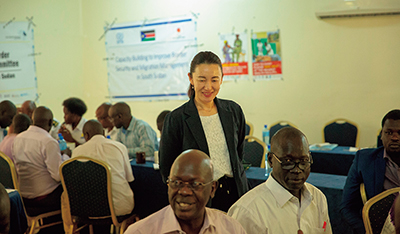 Training on humanitarian border management held for government officials from South Sudan and Uganda (Photo: IOM South Sudan Office)
Training on humanitarian border management held for government officials from South Sudan and Uganda (Photo: IOM South Sudan Office)Reinforcement of border and migration control is an urgent task being actively addressed by the Government of the Republic of South Sudan. Flows of people into South Sudan through irregular means from neighboring countries and movement of people heading for Libya and Europe through South Sudan continue even now. Implementation of tightened immigration control at airports and borders contributes to protection of public order in the country, promotion of safe and regular movement of people, and prevention of migration related crimes, including human trafficking and smuggling. Enhanced migration management in the country through policy formulation and the capacity building of government officials also supports the protection of vulnerable migrants. My work includes providing assistance to these government initiatives in a variety of ways, including organizing seminars, improving infrastructure, formulating policy, and strengthening collaboration with neighboring countries. South Sudan has established many structures since gaining its independence. The same is true in the area of border and migration management. I feel highly honored to have had the opportunity to contribute to South Sudan's “nation building” process through this work. It is also extremely fulfilling to make progress day by day, while overcoming difficulties together, and to deliver genuine results by working closely with government officials. I would say that one of the unique contributions of international organizations is working in alignment with government initiatives and providing targeted assistance.
Naoki Ishikawa, UN Mission in the Republic of South Sudan (UNMISS)
Strategic Planning Unit
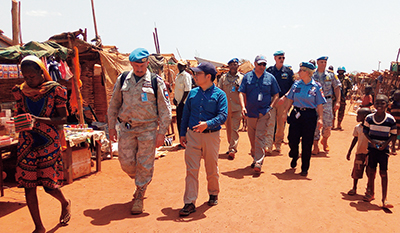 At a UN Protection of Civilians (PoC) site in Wau (in north-western South Sudan). Author in the center.
At a UN Protection of Civilians (PoC) site in Wau (in north-western South Sudan). Author in the center.The real pleasure of working at the UN is to be able to engage in tasks to advance public goods in the international community together with colleagues from various countries. At UNMISS, where I work, we protect civilian populations whose lives are in danger from conflicts and provide assistance to advance the political process for sustainable peace. It is not easy to formulate common goals and strategies, and steadily implement them amid the competing approaches and overwhelming issues related to building peace in South Sudan. Nevertheless, as the staff in charge of strategic planning, it was very satisfying when the strategies were shared, coordination was smoothly advanced across relevant sections of UNMISS and with other UN agencies, and the activities were successfully implemented as planned. I also learned through my work at the UN that it is important to begin with acknowledging differences and respecting each other in a multinational and multicultural environment. While progress is very incremental, I believe that the steady results produced by UNMISS should contribute to giving hope in the future to the people of South Sudan, the world's newest country, and raising the reputation and credibility of UN peacekeeping that contribute to the maintenance of international peace and safety.
(13) Mauritius
Mauritius celebrated the 50th anniversary of its independence in 2018. Under stable political situation, Mauritius actively promotes the diversification of industry into IT and the financial sector, in addition to traditional industries such as sugar production, textiles, and tourism. It maintains a top position in Africa in the World Bank's ease of doing business index, has concluded Free Trade Agreements (FTAs) with African countries and India, and aims to be an investment hub in Africa.
Mauritius is the host country of the secretariats for the Indian Ocean Commission (IOC) and the Indian Ocean Rim Association (IORA). It holds meetings on maritime security and plays an active role in the Contact Group on Piracy off the Coast of Somalia (CGPCS). State Minister for Foreign Affairs Sato visited Mauritius in August. Secretary for Foreign Affairs Ministry of Foreign Affairs, Regional Integration and International Trade Canabady attended the TICAD Ministerial Meeting in October, and held a meeting with Parliamentary Vice-Minister for Foreign Affairs Yamada.
(14) Rwanda
Under the leadership of President Kagame, who took office in 2000 and was re-elected for a third term in 2017, Rwanda continues to work toward economic development and national reconciliation. Recently, the country is experiencing rapid growth especially in the ICT field, and the number of Japanese businesses expanding into Rwanda is on the rise.
There were a number of high-level visits between Japan and Rwanda in 2018. Minister of ICT Rurangirwa visited Japan in March. In July, Japan dispatched the Public- Private Sector Joint Mission for Promoting Trade and Investment in Africa, headed by Parliamentary Vice-Minister for Foreign Affairs Manabu Horii, to Rwanda. Minister for Economic Revitalization Motegi visited Rwanda in August. Minister of State in the Ministry of Foreign Affairs, Cooperation and East African Community Nduhungirehe attended the TICAD Ministerial Meeting in October and held a meeting with Parliamentary Vice-Minister for Foreign Affairs Tsuji. Furthermore, President Kagame made an Official Working Visit to Japan in January 2019. While President Kagame was in Japan, he had a Japan-Rwanda summit meeting. His visit also included a dinner hosted by Prime Minister and Mrs. Abe, participation in the Rwanda-Japan Business Forum, and other events. The two leaders issued a joint statement between Japan and the Republic of Rwanda. This visit is expected to further deepen the bilateral relationship that has been developed up to now.
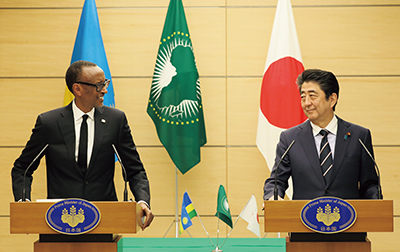 Japan-Rwanda Summit Meeting: Announcement at joint press conference (January 8, 2019, Tokyo; Photo: Cabinet Public Relations Office)
Japan-Rwanda Summit Meeting: Announcement at joint press conference (January 8, 2019, Tokyo; Photo: Cabinet Public Relations Office)
